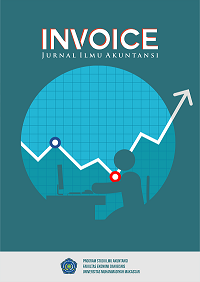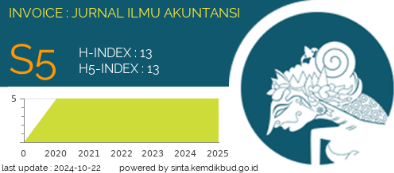Accounting Treatment of Zakat at the National Zakat Agency (Baznas) of Nunukan Regency
Abstract
This study aims to evaluate the accounting treatment of zakat at the National Zakat Agency (BAZNAS) of Nunukan Regency in accordance with the implementation of PSAK 109. Using a qualitative descriptive method with a comparative analysis approach, the study finds that BAZNAS Nunukan generally complies with PSAK 109 in terms of recognition, measurement, presentation, disclosure, and financial reporting. Zakat income and expenditure are recognized on a cash basis, aligning with PSAK 109 provisions. Although the agency has not yet received non-cash zakat assets, it applies prevailing market prices for valuation purposes. The agency demonstrates transparency in disclosing the distribution of zakat, infaq, and sadaqah (ZIS) funds, and its financial reports include a statement of financial position, statement of changes in funds, cash flow statement, and notes to the financial statements. However, challenges remain in fully optimizing the efficiency and transparency of zakat management. This study highlights the importance of standardized accounting practices to improve accountability in zakat institutions. Future research is recommended to explore the integration of digital technologies in zakat financial management systems. This study contributes to the development of Islamic financial reporting by reinforcing the relevance of PSAK 109 in enhancing institutional governance and stakeholder trust.
References
Libraries in the form of textbooks:
Nurhayati, S., & Wasilah. (2011). Sharia accounting in Indonesia (3rd ed.). Salemba Empat.
Muhammad. (2005). Introduction to sharia accountancy. Salemba Empat.
Mu'is, F. (2011). Zakat A–Z: Easy, complete and practical guide about zakat. Medina Ink.
Ikatan Akuntan Indonesia. (2014). Pernyataan Standar Akuntansi Keuangan (PSAK) No. 101 tentang Penyajian Laporan Keuangan Syariah. Ikatan Akuntan Indonesia.
Ikatan Akuntan Indonesia. (2021). Pernyataan Standar Akuntansi Keuangan (PSAK) No. 109 tentang Akuntansi Zakat dan Infak/Sedekah. Ikatan Akuntan Indonesia.
Republik Indonesia. (2011). Undang-Undang Republik Indonesia Nomor 23 Tahun 2011 tentang Pengelolaan Zakat.
Wiyono, S. (2012). Understanding sharia accounting in Indonesia. Mitra Wacana Media.
Libraries in the form of scientific journals:
Astika, S., et al. (2021). Optimizing zakat on poverty alleviation (Study on Baznas Makassar City). Jurnal Ar-Ribh, 4(1).
Harianto, S., & Diana. (2014). Analysis of the implementation of accounting for zakat, infaq, and sadaqah at the Baitul Mal of Lhokseumawe City. Jurnal Manajemen & Bisnis Ekonomi, 15(3).
Herdianto, H., & Wahyu, A. (2021). The role of the state in optimizing zakat in Indonesia. Jurnal Hukum dan Syariah, 2(1), 103–116.
Khatimah, H., et al. (2022). Management and treatment of zakat in Zakat Collection Agency (Baznas) Maros Regency. Al-Qashdu: Jurnal Ekonomi dan Keuangan Syariah, 2(1).
Mahmudi. (2023). Development of zakat accounting system using the latest fund accounting model. Pusat Studi dan Pengembangan Ekonomi Islam (P3EI), Fakultas Ekonomi, Universitas Islam Indonesia.
Mufti, M. S. T. (2023). Accounting analysis of receivables on member financing at BMT Khairul Amin, Banjar Regency. JIEB: Jurnal Ilmiah Ekonomi Bisnis, 9(1), Maret 2023.
Roziq, A., & Yanti, W. (2011). Recognition, measurement, presentation and disclosure of non-halal funds in the financial statements of zakat collection institutions. Jurnal Akuntansi, Universitas Jember.
Sumarno, M. S. (2015). Zakat accounting treatment at the Zakat Collection Agency (Case study at the Zakat Collection Agency of Nunukan Regency). Universitas Negeri Surabaya.
Downloads
Published
Issue
Section
License
Authors who publish with Invoice: Jurnal Ilmu Akuntansi agree to the following terms:
-
Copyright Ownership
The copyright of all articles published in this journal remains with the author(s). However, the authors grant Invoice: Jurnal Ilmu Akuntansi the right of first publication with the work simultaneously licensed under a Creative Commons Attribution 4.0 International License (CC BY 4.0). This license allows others to share, copy, redistribute, adapt, and build upon the work for any purpose, even commercially, as long as proper credit is given to the original author(s) and the source. -
Licensing and Access
Invoice: Jurnal Ilmu Akuntansi provides immediate open access to its content on the principle that making research freely available to the public supports a greater global exchange of knowledge. All published materials are available freely without subscription or payment and can be accessed, downloaded, and reused by any user provided that appropriate attribution is given. -
Permission for Reuse
For uses not covered by the CC BY 4.0 license, such as commercial reprints, translations, or any form of adaptation without clear attribution, users must obtain written permission from the editorial team. Requests for such permissions can be directed to the editorial office at: [invoice@unismuh.ac.id]. -
Plagiarism and Originality
Authors are responsible for the originality of their submissions. All articles are screened for plagiarism using appropriate tools before acceptance. Manuscripts found to contain unoriginal content or infringing materials will be rejected or retracted as per journal policy.














